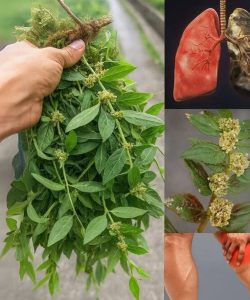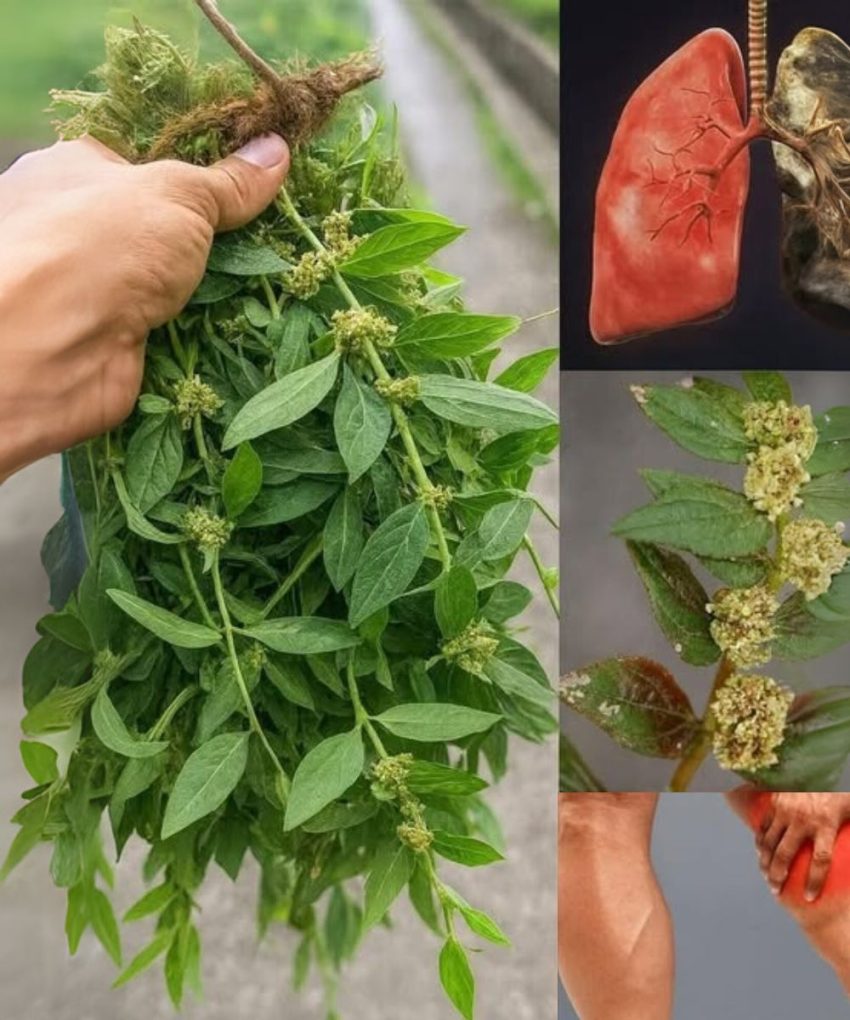What if people walk on something every day that is one of the best plants in the world for healing? You can find euphorbia hirta along roadsides, in fields, or even in your own yard. It is a small shrub that doesn’t stand out. Different places of the world call this plant by different names. Some of them are Asthma Weed, Snake Plant, Dugadhika (in Ayurveda), and Australian Asthma Herb. Even though most people don’t think about it, it has been utilized in traditional medicine for hundreds of years.
Euphorbia hirta is a member of the large Euphorbiaceae family. It grows best in warm, tropical, and subtropical areas. You can find it in portions of Africa, Southeast Asia, Australia, and other places like them. It’s a small plant with hairy stems, short oval leaves, and tiny flowers that grow in clusters. It appears easy. It does, however, have a number of bioactive compounds, such as flavonoids, alkaloids, phenolic acids, tannins, and saponins. These natural compounds are what make the plant so good for you.
For hundreds of years, traditional healers have utilized Euphorbia hirta to help those who have trouble breathing, especially those who suffer asthma. People nickname it “asthma weed” for this reason. People believe that it helps the airways in the lungs open up, which is what a bronchodilator accomplishes. This makes it easier for those with asthma, chronic bronchitis, or allergies that make them cough to breathe. It relaxes the muscles in the respiratory system, which helps with wheezing and shortness of breath. It also helps clear mucus from the lungs and airways, which makes it simpler to cough up phlegm while you’re sick. One approach to be ready is to create herbal tea by adding a teaspoon of dried leaves to boiling water and letting them sit for 10 to 15 minutes. This tea will help you breathe easier and make your throat and lungs less swollen if you drink it twice a day.

People also know that Euphorbia hirta is good for the stomach. It is used in a lot of old-fashioned medications to cure diarrhea, dysentery, stomach cramps, bloating, and even problems caused by parasites. The plant’s natural antibacterial properties help get rid of harmful pathogens like E. coli and Shigella, which are typical causes of stomach troubles in tropical environments. It can also destroy parasites, which means it can get rid of worms in the intestines. It has astringent properties that assist the intestines’ lining get tighter and firmer. This stops your body from losing too much liquids when you have diarrhea. Making it as a decoction, which usually entails boiling 1–2 tablespoons of the dried herb in water for about 10 minutes, and taking it once or twice a day may help with an upset stomach, lower inflammation in the gut, and get the digestive system back in balance.
Euphorbia hirta is good for your skin, even though you might not believe so. It kills bacteria, fungi, and inflammation, thus a lot of people use it to mend things outside. People have used it for a long time to treat skin problems including acne and impetigo, as well as fungal illnesses like ringworm and athlete’s foot. Most people make a paste out of the fresh leaves and put it right on the places that pain. The medicine helps the skin’s redness, swelling, and growth of germs go down. Some people even bathe in water that has Euphorbia hirta in it to help heal cuts, burns, and bug bites, or to calm skin irritations that won’t go away. It helps cells grow back, which speeds up the healing of tissues and repairs.
The herb is also good for the kidneys and bladder. Euphorbia hirta is a natural diuretic that has been used in traditional medicine. Anything that makes you pee more is a diuretic. This helps your body get rid of waste and toxins. If you have a urinary tract infection (UTI) and have to go to the bathroom a lot and feel like you’re burning, this effect can be quite helpful. People think it can help lower inflammation in the urinary tract, ease bladder pain, and even inhibit kidney stones from forming by stopping calcium oxalate crystals from building up. Soak about a teaspoon of the dry herb in boiling water for 10 minutes to make a simple infusion that will help you pee. After that, strain the liquid and drink it once or twice a day, but only if your doctor says it’s okay.
Euphorbia hirta is also good for the immune system because it helps it and makes it stronger. Flavonoids and phenolic compounds are powerful antioxidants that assist the body get rid of free radicals. This makes oxidative stress and inflammation less severe. Euphorbia hirta may be able to fight off some viruses, notably those that induce fever, and bacteria like Staphylococcus aureus, according to recent studies on herbs. If you’re sick or getting better, drinking a cup of Euphorbia hirta tea every day could improve your immune system, lower your temperature, and make you stronger overall. One reason it is still utilized in many traditional medical systems is that it boosts the immune system.
Euphorbia hirta has a lot of great things about it, but you need still be careful with it. Getting the right dose and learning how to make herbal medicines are quite vital for many of them. in is normally safe if you use in the appropriate method and in the right dosage. But it could cause difficulties if you take too much or utilize it the incorrect way. Pregnant or breastfeeding women, people with health difficulties, or those who take prescription drugs should talk to a certified healthcare professional before taking it for medical reasons.
Euphorbia hirta provides us an important lesson: the best natural cures are sometimes the ones we don’t think of. People sometimes think this small plant is a weed, but it shows how nature can help us heal. Over the years, this plant has helped a lot of people stay healthy by making it easier to breathe, easing stomachaches, calming inflammatory skin, and boosting the immune system. More and more people are interested in natural health and herbal treatment. We might want to take another look at what’s sprouting under our feet. The next time you encounter this small bush, you might be walking over a green treasure that you didn’t know you had.
